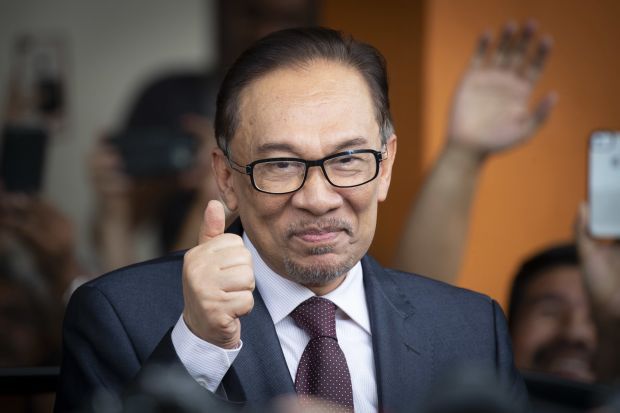Anwar under the spotlight

Anwar’s statement that he would welcome any help to win in Port Dickson, including support from Umno’s Padang Rengas MP Datuk Seri Nazri Aziz, has added to the mistrust and apprehension.
M. Veera Pandiyan, The Star
SOMETIME in 1993, I was in the meeting hall of the Air Keroh Village Resort in Melaka, listening to Malaysia’s rising political star.
He spoke in his trademark fervent, animated style and the subject was “The Clash of Civilisations”, espoused by the late political theorist, Samuel Huntington.
As the state correspondent for The Star, I was wondering how to write the news story as it had no relevance to the Umno political gathering.
The speaker was Datuk Seri Anwar Ibrahim, leader of “Team Wawasan” which was campaigning to secure all top posts, except the presidency, which was held by Prime Minister Tun (then Datuk Seri) Dr Mahathir Mohamad.
At the end of Anwar’s speech, I asked a delegate sitting next to me whether he understood what it was all about. His answer was: “Tak sangat lah, tapi Pak Sheikh hebat, kan?” (Not really, but Pak Sheikh was great, wasn’t he?)
That was his nickname then because of his reputed Islamic credentials. He was indeed regarded as hebat (great) in the heady days when “Melayu Baru” was Umno’s favoured slogan and designer suits and patent leather shoes defined the refined tastes of leaders and wannabes.
Veteran journalists who covered politics might remember the 1993 Umno polls as a significant milestone in the party’s history. Among other things, that was the year when the term “money politics” came into play in the party.
In those days, candidates for the top two posts could get 10 bonus votes for each nomination from a party division.
Ghafar withdrew from the race midway when he failed to get enough nominations. Anwar, who was Finance Minister, won the Number Two post unopposed and was soon named DPM. He was arguably the most popular leader in the party, if not the most powerful.
In his presidential speech at the Umno annual general meeting the following year, Dr Mahathir quoted this famous line from Shakespeare’s Julius Caesar: “Et tu, Brute!”
Until today, Dr Mahathir has not explained whom the remarks were targeted at but it was widely perceived as an expression against Anwar’s lack of patience in wanting to take over.
The fallout came in 1997 in the wake of the Asian Financial crisis. Anwar was sacked a year later and in April 1999, jailed six years for abuse of power and sodomy.
Since then, much water has flowed under the bridge for the once bitter foes.
Anwar was freed by the Federal Court and returned to Parliament via a by-election in 2008. He retained the seat in the 2013 general election but two years later, he was back in prison after the Federal Court upheld the Court of Appeal’s March 7, 2014 decision to jail him five years for sodomising an aide.
But a week after Pakatan Harapan’s momentous win in the May 9 general election, Anwar became a free man again after getting a full pardon from the King.
With the impending by-election in Port Dickson, talk about Anwar’s perceived impatience to be in power has resurfaced.
Over the past week, social media has been rife with acrimony against the PKR leader, including from people who had been defending him for decades.
Although Dr Mahathir has pledged to hand over the reins to Anwar when he steps down and the top leadership of DAP and Amanah has endorsed this, it does not appear to be a given, based on the sentiments being expressed by ordinary folk.
The people are tired of by-elections, more so those that are for what is seen as “entitled leadership”.
It has been reported that Anwar has been among the leading triggers for by-elections over the past decade, causing four out of the 33.
In addition to questions about Anwar’s ability to unite the rival factions in PKR, people are also wondering about the “reform agenda” that he often talks about.
If it is about reforming key institutions and revamping the civil service and parliamentary procedures, they expect him to explain how he would do things differently, in terms of specific plans and policies.
His track record as Deputy Prime Minister, Finance Minister and Education Minister is also being re-examined, such as his role in the Islamisation of the education system and the civil service.
Anwar’s statement that he would welcome any help to win in Port Dickson, including support from Umno’s Padang Rengas MP Datuk Seri Nazri Aziz, has added to the mistrust and apprehension.
Nazri urged Umno not to contest in Port Dickson, saying that would not be in line with the party’s efforts to regain control of the federal government.
Last week, he revealed that Umno MPs had signed statutory declarations entrusting their new leader Datuk Seri Ahmad Zahid Hamidi to negotiate with other parties, including PH coalition members and PAS, to form the government.
Former Johor MB Datuk Seri Mohamed Khaled Nordin raised the prospect of a new coalition comprising Umno, PAS, PKR, Gabungan Parti Sarawak and Gabungan Bersatu Sabah to form the next government.
Malaysians, who are enjoying a respite from being under the yoke of a corrupt government, are spooked by the possibility.
Anwar could allay their fears by clearly denouncing such plans.

